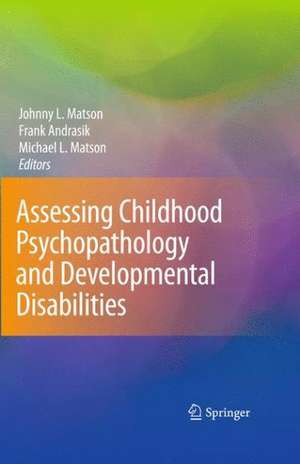Assessing Childhood Psychopathology and Developmental Disabilities
Editat de Johnny L. Matson, Frank Andrasik, Michael L. Matsonen Limba Engleză Paperback – 13 oct 2010
Assessing Childhood Psychopathology and Developmental Disabilities provides a wide range of evidence-based methods in an immediately useful presentation from infancy through adolescence. Noted experts offer the most up-to-date findings in the most pressing areas, including: (1) Emerging trends, new technologies, and implementation issues. (2) Interviewing techniques and report writing guidelines. (3) Intelligence testing, neuropsychological assessment, and scaling methods for measuring psychopathology. (4) Assessment of major pathologies, including ADHD, conduct disorder, bipolar disorder, and depression. (5) Developmental disabilities, such as academic problems, the autism spectrum and comorbid pathology, and self-injury. (6) Behavioral medicine, including eating and feeding disorders as well as pain management.
This comprehensive volume is an essential resource for the researcher’s library and the clinician’s desk as well as a dependable text for graduate and postgraduate courses in clinical child, developmental, and school psychology.
(A companion volume, Treating Childhood Psychopathology and Developmental Disabilities, is also available to ensure greater continuity on the road from assessment to intervention to outcome.)
| Toate formatele și edițiile | Preț | Express |
|---|---|---|
| Paperback (1) | 723.49 lei 6-8 săpt. | |
| Springer – 13 oct 2010 | 723.49 lei 6-8 săpt. | |
| Hardback (1) | 959.98 lei 6-8 săpt. | |
| Springer – 2 dec 2008 | 959.98 lei 6-8 săpt. |
Preț: 723.49 lei
Preț vechi: 851.17 lei
-15% Nou
Puncte Express: 1085
Preț estimativ în valută:
138.44€ • 144.91$ • 115.23£
138.44€ • 144.91$ • 115.23£
Carte tipărită la comandă
Livrare economică 31 martie-14 aprilie
Preluare comenzi: 021 569.72.76
Specificații
ISBN-13: 9781441918628
ISBN-10: 1441918620
Pagini: 516
Ilustrații: X, 506 p.
Dimensiuni: 193 x 260 x 27 mm
Greutate: 1.16 kg
Ediția:Softcover reprint of hardcover 1st ed. 2009
Editura: Springer
Colecția Springer
Locul publicării:New York, NY, United States
ISBN-10: 1441918620
Pagini: 516
Ilustrații: X, 506 p.
Dimensiuni: 193 x 260 x 27 mm
Greutate: 1.16 kg
Ediția:Softcover reprint of hardcover 1st ed. 2009
Editura: Springer
Colecția Springer
Locul publicării:New York, NY, United States
Public țintă
Professional/practitionerCuprins
History, Overview, and Trends in Child and Adolescent Psychological Assessment.- Diagnostic Classification Systems.- Interview and Report Writing.- Assessment of Specific Problems.- Intelligence Testing.- Rating Scale Systems for Assessing Psychopathology: The Achenbach System of Empirically Based Assessment (ASEBA) and the Behavior Assessment System for Children-2 (BASC-2).- Neuropsychological Disorders of Children.- Assessment of Specific Pychopathologies.- Assessment of Conduct Problems.- Evidence-Based Assessment of Attention-Deficit/ Hyperactivity Disorder (ADHD).- Assessment of Mood Disorders in Children and Adolescents.- Assessment of Bipolar Disorder In Children.- Assessment of Problems Developmental Disabilities.- Academic Assessment.- Behavioral Assessment of Self-Injury.- Autism Spectrum Disorders and Comorbid Psychopathology.- Behavioral Medicine.- Assessment of Eating Disorder Symptoms In Children and Adolescents.- Pain Assessment.- Assessment of Pediatric Feeding Disorders.
Recenzii
From the reviews:
“Chapters begin with a clear statement about the importance of the topic, flowing smoothly to key issues, subtopics, and a wealth of research findings. … Psychologists who want to support their decisions scientifically, ethically and legally will find the information enormously valuable. The writing is smooth and easy to absorb with surprising consistency throughout considering the depth and breath of the contributors. The get to the point presentation makes the narrative interesting and comfortable to use as a reference.” (The Psychology Times, Vol. 2 (3), November, 2010)
“Chapters begin with a clear statement about the importance of the topic, flowing smoothly to key issues, subtopics, and a wealth of research findings. … Psychologists who want to support their decisions scientifically, ethically and legally will find the information enormously valuable. The writing is smooth and easy to absorb with surprising consistency throughout considering the depth and breath of the contributors. The get to the point presentation makes the narrative interesting and comfortable to use as a reference.” (The Psychology Times, Vol. 2 (3), November, 2010)
Notă biografică
Johnny L. Matson, is Professor and Distinguished Research Master and Director of Clinical Psychology in the Department of Psychology at Louisiana State University in Baton Rouge, LA. He is the author of 29 books and more than 350 scientific papers and book chapters. His area of clinical and research interests are developmental disabilities, autism, and severe child psychopathology.
Frank Andrasik holds the positions of Professor of Psychology at the University of West Florida and Senior Research Scientist at the Florida Institute for Human and Machine Cognition. He has published approximately 200 articles and chapters and has delivered more than 450 talks on the topics of pain, stress, biofeedback, developmental disability, psychiatry, and organizational behavior management; he has also produced several texts for professionals. His most recent published texts are Biofeedback: A Practitioner’s Guide, 3rd edition (Guilford, $80), co-edited with Mark S. Schwartz in 2003, and Comprehensive Handbook of Personality and Psychopathology, Volume Two: Adult Psychopathology (Wiley, $200), an edited volume that has just been released (with a publication date of 2006). He belongs to a number of professional societies, holding the status of Fellow in the American Psychological Association (Division of Health Psychology and Society of Clinical Psychology), American Psychological Society, and Society of Behavioral Medicine, and serving as President of the Association for Applied Psychophysiology and Biofeedback in 1993-1994.
Michael L. Matson is a student at Louisiana State University. He is co-author of 2 books and 7 scientific papers. His research interests are in the area of developmental disabilities.
Frank Andrasik holds the positions of Professor of Psychology at the University of West Florida and Senior Research Scientist at the Florida Institute for Human and Machine Cognition. He has published approximately 200 articles and chapters and has delivered more than 450 talks on the topics of pain, stress, biofeedback, developmental disability, psychiatry, and organizational behavior management; he has also produced several texts for professionals. His most recent published texts are Biofeedback: A Practitioner’s Guide, 3rd edition (Guilford, $80), co-edited with Mark S. Schwartz in 2003, and Comprehensive Handbook of Personality and Psychopathology, Volume Two: Adult Psychopathology (Wiley, $200), an edited volume that has just been released (with a publication date of 2006). He belongs to a number of professional societies, holding the status of Fellow in the American Psychological Association (Division of Health Psychology and Society of Clinical Psychology), American Psychological Society, and Society of Behavioral Medicine, and serving as President of the Association for Applied Psychophysiology and Biofeedback in 1993-1994.
Michael L. Matson is a student at Louisiana State University. He is co-author of 2 books and 7 scientific papers. His research interests are in the area of developmental disabilities.
Textul de pe ultima copertă
Not long ago, conducting child assessment was as simple as stating that "the child gets along with others" or "the child lags behind his peers." Today’s pediatric psychologists and allied professionals, by contrast, know the critical importance of using accurate measures with high predictive quality to identify pathologies early, form precise case conceptualizations, and provide relevant treatment options.
Assessing Childhood Psychopathology and Developmental Disabilities provides a wide range of evidence-based methods in an immediately useful presentation from infancy through adolescence. Noted experts offer the most up-to-date findings in the most pressing areas, including:
This comprehensive volume is an essential resource for the researcher’s library and the clinician’s desk as well as a dependable text for graduate and postgraduate courses in clinical child, developmental, and school psychology.
(A companion volume, Treating Childhood Psychopathology and Developmental Disabilities, is also available to ensure greater continuity on the road from assessment to intervention to outcome.)
Assessing Childhood Psychopathology and Developmental Disabilities provides a wide range of evidence-based methods in an immediately useful presentation from infancy through adolescence. Noted experts offer the most up-to-date findings in the most pressing areas, including:
- Emerging trends, new technologies, and implementation issues.
- Interviewing techniques and report writing guidelines.
- Intelligence testing, neuropsychological assessment, and scaling methods for measuring psychopathology.
- Assessment of major pathologies, including ADHD, conduct disorder, bipolar disorder, and depression.
- Developmental disabilities, such as academic problems, the autism spectrum and comorbid pathology, and self-injury.
- Behavioral medicine, including eating and feeding disorders as well as pain management.
This comprehensive volume is an essential resource for the researcher’s library and the clinician’s desk as well as a dependable text for graduate and postgraduate courses in clinical child, developmental, and school psychology.
(A companion volume, Treating Childhood Psychopathology and Developmental Disabilities, is also available to ensure greater continuity on the road from assessment to intervention to outcome.)
Caracteristici
Provides a wide range of evidence-based treatments in an immediately useful presentation from infancy through adolescence Explores interventions for significant childhood pathologies, developmental disabilities, and behavioral medicine Examines emerging trends, new technologies, and treatment issues Discusses the effects of parenting in treatment outcomes Examines techniques for improving communication, language, and literacy in children with developmental disabilities Provides a critical analysis of the strengths and weaknesses of current assessment tools and techniques as well as future trends Companion volume focuses on empirically based treatments Includes supplementary material: sn.pub/extras










